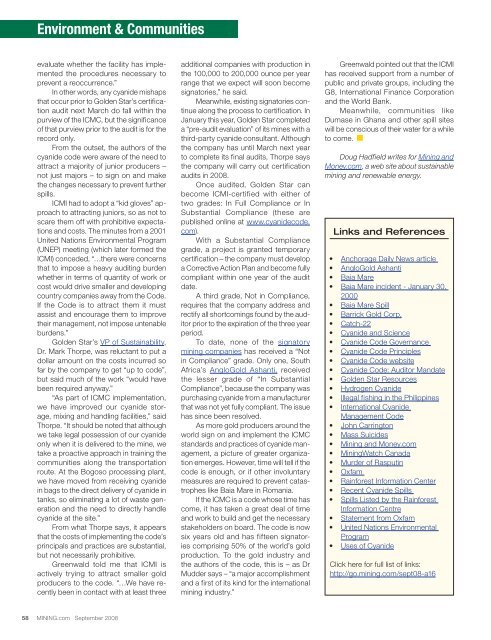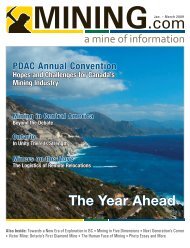Create successful ePaper yourself
Turn your PDF publications into a flip-book with our unique Google optimized e-Paper software.
Environment & Communities<br />
evaluate whether the facility has implemented<br />
the procedures necessary to<br />
prevent a reoccurrence.”<br />
In other words, any cyanide mishaps<br />
that occur prior to Golden Star’s certification<br />
audit next March do fall within the<br />
purview of the ICMC, but the significance<br />
of that purview prior to the audit is for the<br />
record only.<br />
From the outset, the authors of the<br />
cyanide code were aware of the need to<br />
attract a majority of junior producers –<br />
not just majors – to sign on and make<br />
the changes necessary to prevent further<br />
spills.<br />
ICMI had to adopt a “kid gloves” approach<br />
to attracting juniors, so as not to<br />
scare them off with prohibitive expectations<br />
and costs. The minutes from a 2001<br />
United Nations Environmental Program<br />
(UNEP) meeting (which later formed the<br />
ICMI) conceded, “…there were concerns<br />
that to impose a heavy auditing burden<br />
whether in terms of quantity of work or<br />
cost would drive smaller and developing<br />
country <strong>com</strong>panies away from the Code.<br />
If the Code is to attract them it must<br />
assist and encourage them to improve<br />
their management, not impose untenable<br />
burdens.”<br />
Golden Star’s VP of Sustainability,<br />
Dr. Mark Thorpe, was reluctant to put a<br />
dollar amount on the costs incurred so<br />
far by the <strong>com</strong>pany to get “up to code”,<br />
but said much of the work “would have<br />
been required anyway.”<br />
“As part of ICMC implementation,<br />
we have improved our cyanide storage,<br />
mixing and handling facilities,” said<br />
Thorpe. “It should be noted that although<br />
we take legal possession of our cyanide<br />
only when it is delivered to the mine, we<br />
take a proactive approach in training the<br />
<strong>com</strong>munities along the transportation<br />
route. At the Bogoso processing plant,<br />
we have moved from receiving cyanide<br />
in bags to the direct delivery of cyanide in<br />
tanks, so eliminating a lot of waste generation<br />
and the need to directly handle<br />
cyanide at the site.”<br />
From what Thorpe says, it appears<br />
that the costs of implementing the code’s<br />
principals and practices are substantial,<br />
but not necessarily prohibitive.<br />
Greenwald told me that ICMI is<br />
actively trying to attract smaller gold<br />
producers to the code. “…We have recently<br />
been in contact with at least three<br />
58 <strong>MINING</strong>.<strong>com</strong> September 2008<br />
additional <strong>com</strong>panies with production in<br />
the 100,000 to 200,000 ounce per year<br />
range that we expect will soon be<strong>com</strong>e<br />
signatories,” he said.<br />
Meanwhile, existing signatories continue<br />
along the process to certification. In<br />
January this year, Golden Star <strong>com</strong>pleted<br />
a “pre-audit evaluation” of its mines with a<br />
third-party cyanide consultant. Although<br />
the <strong>com</strong>pany has until March next year<br />
to <strong>com</strong>plete its final audits, Thorpe says<br />
the <strong>com</strong>pany will carry out certification<br />
audits in 2008.<br />
Once audited, Golden Star can<br />
be<strong>com</strong>e ICMI-certified with either of<br />
two grades: In Full Compliance or In<br />
Substantial Compliance (these are<br />
published online at www.cyanidecode.<br />
<strong>com</strong>).<br />
With a Substantial Compliance<br />
grade, a project is granted temporary<br />
certification – the <strong>com</strong>pany must develop<br />
a Corrective Action Plan and be<strong>com</strong>e fully<br />
<strong>com</strong>pliant within one year of the audit<br />
date.<br />
A third grade, Not in Compliance,<br />
requires that the <strong>com</strong>pany address and<br />
rectify all short<strong>com</strong>ings found by the auditor<br />
prior to the expiration of the three year<br />
period.<br />
To date, none of the signatory<br />
mining <strong>com</strong>panies has received a “Not<br />
in Compliance” grade. Only one, South<br />
Africa’s AngloGold Ashanti, received<br />
the lesser grade of “In Substantial<br />
Compliance”, because the <strong>com</strong>pany was<br />
purchasing cyanide from a manufacturer<br />
that was not yet fully <strong>com</strong>pliant. The issue<br />
has since been resolved.<br />
As more gold producers around the<br />
world sign on and implement the ICMC<br />
standards and practices of cyanide management,<br />
a picture of greater organization<br />
emerges. However, time will tell if the<br />
code is enough, or if other involuntary<br />
measures are required to prevent catastrophes<br />
like Baia Mare in Romania.<br />
If the ICMC is a code whose time has<br />
<strong>com</strong>e, it has taken a great deal of time<br />
and work to build and get the necessary<br />
stakeholders on board. The code is now<br />
six years old and has fifteen signatories<br />
<strong>com</strong>prising 50% of the world’s gold<br />
production. To the gold industry and<br />
the authors of the code, this is – as Dr<br />
Mudder says – “a major ac<strong>com</strong>plishment<br />
and a first of its kind for the international<br />
mining industry.”<br />
Greenwald pointed out that the ICMI<br />
has received support from a number of<br />
public and private groups, including the<br />
G8, International Finance Corporation<br />
and the World Bank.<br />
Meanwhile, <strong>com</strong>munities like<br />
Dumase in Ghana and other spill sites<br />
will be conscious of their water for a while<br />
to <strong>com</strong>e.<br />
Doug Hadfield writes for Mining and<br />
Money.<strong>com</strong>, a web site about sustainable<br />
mining and renewable energy.<br />
Links and References<br />
Anchorage Daily News article<br />
AngloGold Ashanti<br />
Baia Mare<br />
Baia Mare incident - January 30,<br />
2000<br />
Baia Mare Spill<br />
Barrick Gold Corp.<br />
Catch-22<br />
Cyanide and Science<br />
Cyanide Code Governance<br />
Cyanide Code Principles<br />
Cyanide Code website<br />
Cyanide Code: Auditor Mandate<br />
Golden Star Resources<br />
Hydrogen Cyanide<br />
Illegal fishing in the Philippines<br />
International Cyanide<br />
Management Code<br />
John Carrington<br />
Mass Suicides<br />
Mining and Money.<strong>com</strong><br />
MiningWatch Canada<br />
Murder of Rasputin<br />
Oxfam<br />
Rainforest Information Center<br />
Recent Cyanide Spills<br />
Spills Listed by the Rainforest<br />
Information Centre<br />
Statement from Oxfam<br />
United Nations Environmental<br />
Program<br />
Uses of Cyanide<br />
Click here for full list of links:<br />
http://go.mining.<strong>com</strong>/sept08-a16




